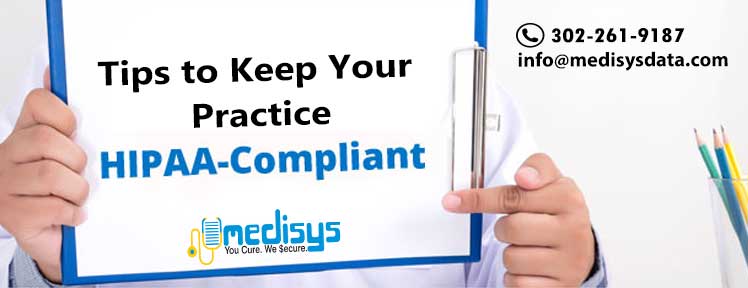The Health Insurance Portability and Accountability Act (HIPAA) was introduced in year 1996. As the name suggests, it was created to ensure that all ‘protected health information’ was appropriately secured and restricted access to be given only to authorized individuals. Another goal was to prevent healthcare fraud. Healthcare providers, health plans, and healthcare clearinghouses are primarily covered under HIPAA. Healthcare professionals are most often told it is important to comply with HIPAA because of the penalties for noncompliance. A different argument is that HIPAA compliance builds trust, which gives patients the confidence to reveal details about their health to healthcare professionals, which improves the delivery of healthcare. Whatever might be the reason, its important that your practice must be HIPAA compliant. In this article, we shared few tips to keep your practice HIPAA compliant.
HIPAA Training to RCM Team
Your revenue cycle team must understand the importance and confidentiality for the information the they are handling. Your RCM team must be trained properly on ways how to process, transfer the data. Each and every team member must be aware of all guidelines of HIPAA compliance and you must conduct frequent internal audits to ensure that.
Scope of PHI
Some providers think that protecting patient privacy is limited to masking basic information such as names and SSNs. In reality, it applies to any information that is personal or unique to a patient. This could include patient phone numbers, emails, addresses, etc. According to HIPAA rules, contact information is equal to medical information and must be guarded and protected. Your team must be aware what constitutes Protected Health Information (PHI).
Restricted Access
Patient demographics and insurance data are confidential information which must be accessed by authorized person only. Not everyone in your RCM can have access to that information, information will be shared only if valid reason is available.
Data Sharing
Constantly review your methods of data sharing. Most practices shares crucial patient data on email without any password or encryption. Provider often email detailed information to patients that should not be read or received by others. To avoid a HIPAA violation, make absolutely sure that these emails are encrypted.
Business Associate Agreement
Have Business Associate Agreement (BAA) in place for all activities that require data sharing with outside entity. Whether it’s billing company or collection agency, enter into a standard BAA in place before started working.
Use of Electronic Devices
There are also rules that apply to the types of electronic devices i.e., computers, smartphones, tablets, etc. that are used to store and send information. Frequently, providers will use their personal devices to send information to patients, which could be a serious HIPAA violation.
Secured Hard Copies
Electronic data is on boom but we cannot ignore the importance of hard copies of the patient’s documents. Here, administrative team should keep all the essential copies in locked cabinets with only access to the authorized staff members. Be very careful about how you maintain patient files, as well as how to dispose of them when needed.
Get Cyber Insurance
We now operate in a world where hacking, ransomware and other types of cyberattacks are common, and practices need to be more vigilant than ever before. The costs related to a cyberattack and a resulting violation will be far more expensive than your investment in insurance. Be sure to work with your insurance agency to determine the level of cyber insurance necessary to properly protect your practice.
HIPPAA is a very serious regulatory process that must be carefully followed by all healthcare practices. The good news is that HIPPA guidelines are clear and easily understood when reviewed regularly. You can also look for annual updates to ensure that your practice continues to follow the most current regulations.












